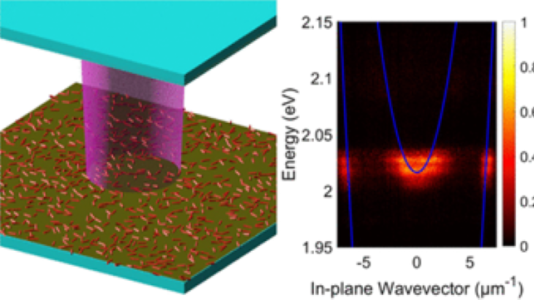
Scientific Achievement
Rare earth complexes show promise as lighting sources and in quantum technologies but are limited by their long optical lifetimes leading to weak photoluminescence (PL). In this study, the PL of a triply ionized europium complex was significantly increased by resonance tuning in an optical cavity.
Significance and Impact
These findings indicate that rare-earth molecules combined with photonics are very promising candidates for lighting, optoelectronic, and quantum-related applications.
Research Details
An increase in the decay rate by two orders of magnitude along with an increase of 30 in PL intensity was achieved by tuning a Fabry−Pérot cavity into resonance with the rare earth complex emission.
Work was performed at the Center for Nanoscale Materials.
About Argonne’s Center for Nanoscale Materials
The Center for Nanoscale Materials is one of the five DOE Nanoscale Science Research Centers, premier national user facilities for interdisciplinary research at the nanoscale supported by the DOE Office of Science. Together the NSRCs comprise a suite of complementary facilities that provide researchers with state-of-the-art capabilities to fabricate, process, characterize and model nanoscale materials, and constitute the largest infrastructure investment of the National Nanotechnology Initiative. The NSRCs are located at DOE’s Argonne, Brookhaven, Lawrence Berkeley, Oak Ridge, Sandia and Los Alamos National Laboratories. For more information about the DOE NSRCs, please visit https://science.osti.gov/User-Facilities/User-Facilities-at-a-Glance.
Argonne National Laboratory seeks solutions to pressing national problems in science and technology. The nation’s first national laboratory, Argonne conducts leading-edge basic and applied scientific research in virtually every scientific discipline. Argonne researchers work closely with researchers from hundreds of companies, universities, and federal, state and municipal agencies to help them solve their specific problems, advance America’s scientific leadership and prepare the nation for a better future. With employees from more than 60 nations, Argonne is managed by UChicago Argonne, LLC for the U.S. Department of Energy’s Office of Science.
The U.S. Department of Energy’s Office of Science is the single largest supporter of basic research in the physical sciences in the United States and is working to address some of the most pressing challenges of our time. For more information, visit https://energy.gov/science.